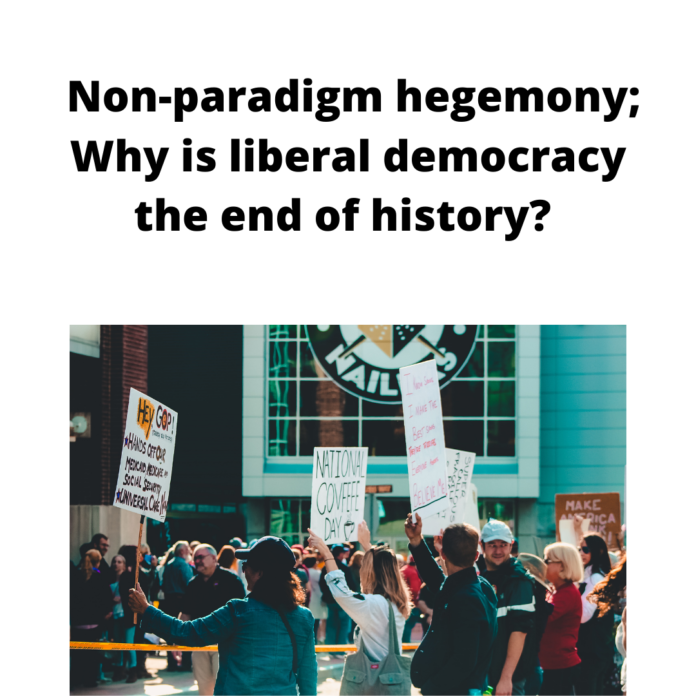The positive aspect of the Enlightenment in the post-Renaissance world was the proliferation of political teachings. Overlapping with Darwinism, Hegelianism, Enlightenment rationalism, and the transition from the doctrine of mercantilism to its replacement by the classical and marginalist doctrine, the potential conditions for the emergence of political teachings were nurtured. In this reference, Hegel depicted the historical dialectic by changing the nature of the extreme left and right formulations. Based on this important and changing the dialectical aspect from ideal to material, Marxism explained the critical paradigm with a negative approach by laying the groundwork for historical materialism and its bias in favor of class struggle.
In this description, a dominant force was thought to be the factors of material production, rising in a regular series from the first commune to the second commune and Marxist utopia. The consistency of this idea lay in Marx’s abstract determinism of dialectical materialism. This claim is consistent with the description of four areas; In the first area, Marx’s views on Judaism and feminism, in the second area Lenin and Marxist-Leninist justifications for the industrialization of the Tsarist Russian Empire and Kerensky’s socialist government, in the third area the extension of Marx’s dogma to Lenin in the view of Joseph Stalin and Leon Trotsky’s “Persistent Revolution” and the process of de-Stalinization of Nikita Khrushchev and finally the policies of Glasnost and Prostroika of Gorbachevism in the fourth realm of Frankfurt and the return to the roots of Marxism.
Similarly, obedience to Hegelian anti-individualism in the footsteps of the powerful role of the state under Rousseau’s thinking found a logical sequence in the totalitarian regimes of Benito Mussolini’s Fascist Party in Italy and the National Socialist Workers’ Party in Germany. Totalitarianism, based on the concept of “hegemony” by Antonio Gramsci, in the propaganda policy of Nazism under Goebbels and Mussolini’s populism. Found. Marxism-Leninism, Maoism, Fascism, and Nazism as Pioneers of Totalitarianism by Drawing a Monopoly Party, Political Pluralism, Defining the Subjectivity of the Individual in the State Institution, Individualism and Marxism as Prescribing the “Historical Forces of Dialectical Materialism” The emergence of the state and Nazism as historical presuppositions for apartheid, reform, and the unification of the German people eliminated moral reality and established a pretext for dogmatic paradigms with a hegemonic approach.
Amidst the political teachings, the political doctrine of liberalism emerged with the minimal intervention of the state, under the banner of law, and with reliance on social realities. The primary allegory of the minimal government in Loyatan Hobbes by saying that the government was established on the basis of a social contract for security, its secondary allegory in Locke’s views by the separation of primary and secondary rights and the founding of “individualism” in political thought, its third allegory by the Montesquieu trio. Jean-Jacques Rousseau and his fourth allegory are embedded in the doctrine of democracy in the form of “liberal democracy”, which is the highest manifestation of the political system in Popper’s views. The theoretical evolution of this political doctrine took a different trajectory in Italy, France, and Britain, and later in the United States.
The pluralistic construction of liberalism facilitates the integration of this doctrine with political pluralism and removes the paradigmatic and dogmatic aspect of it. An example of this lies in the views of pluralist scholars such as Isa Berlin and John Rawls. Berlin goes on to distinguish between Benjamin Konstanz, the freedom of ancient and modern times, the separation of the most important liberal principle, “freedom” in the form of positive and negative freedom with great flexibility that opposes any aspect of unification, and Rawls proposed a new social contract based on Justice as fairness created the new quest for the American right. Using the theory of justice, Rawls used the necessity of justice as the first condition of rationality in the social contract to expand the capitalist structure of liberalism by focusing the social contract on justice.
Flexibility, the separation of the private and public spheres, the prevention of the tyranny of the majority over the minority, combined with democracy and pluralism, and the potentially unified and irregular structure of liberalism, herald its moral superiority, The absence of abstract deviations is abundantly found in the text of Marxism. Finally, based on the above, liberalism is not the end of post-Cold War history, but the end of history for one-party and dogmaticisms.










